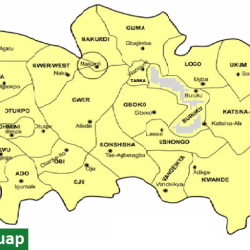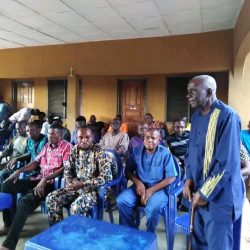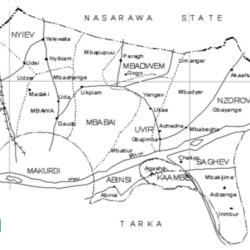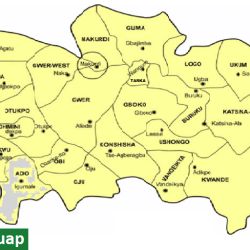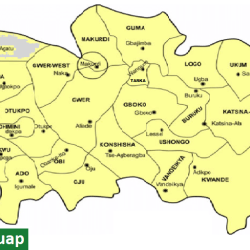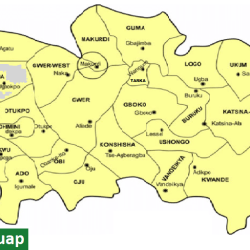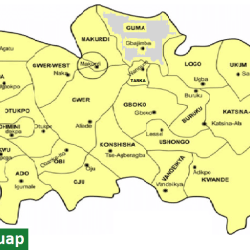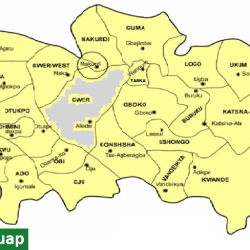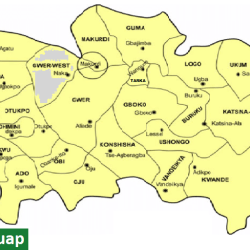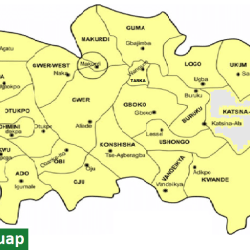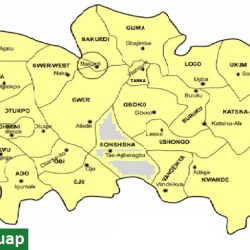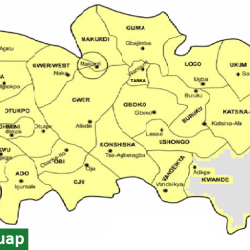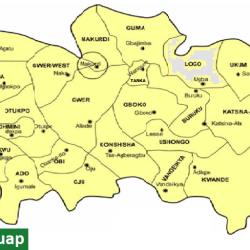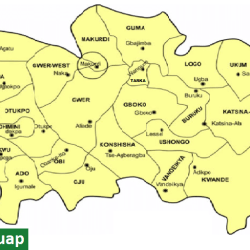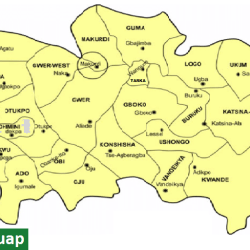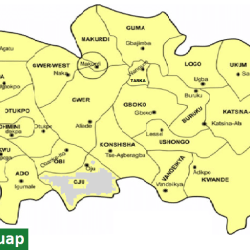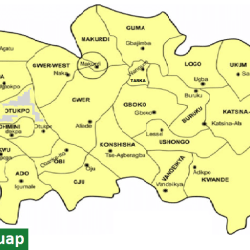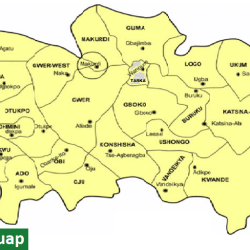Buruku Local Government is one of the 23 Local Government in Benue State of Nigeria.
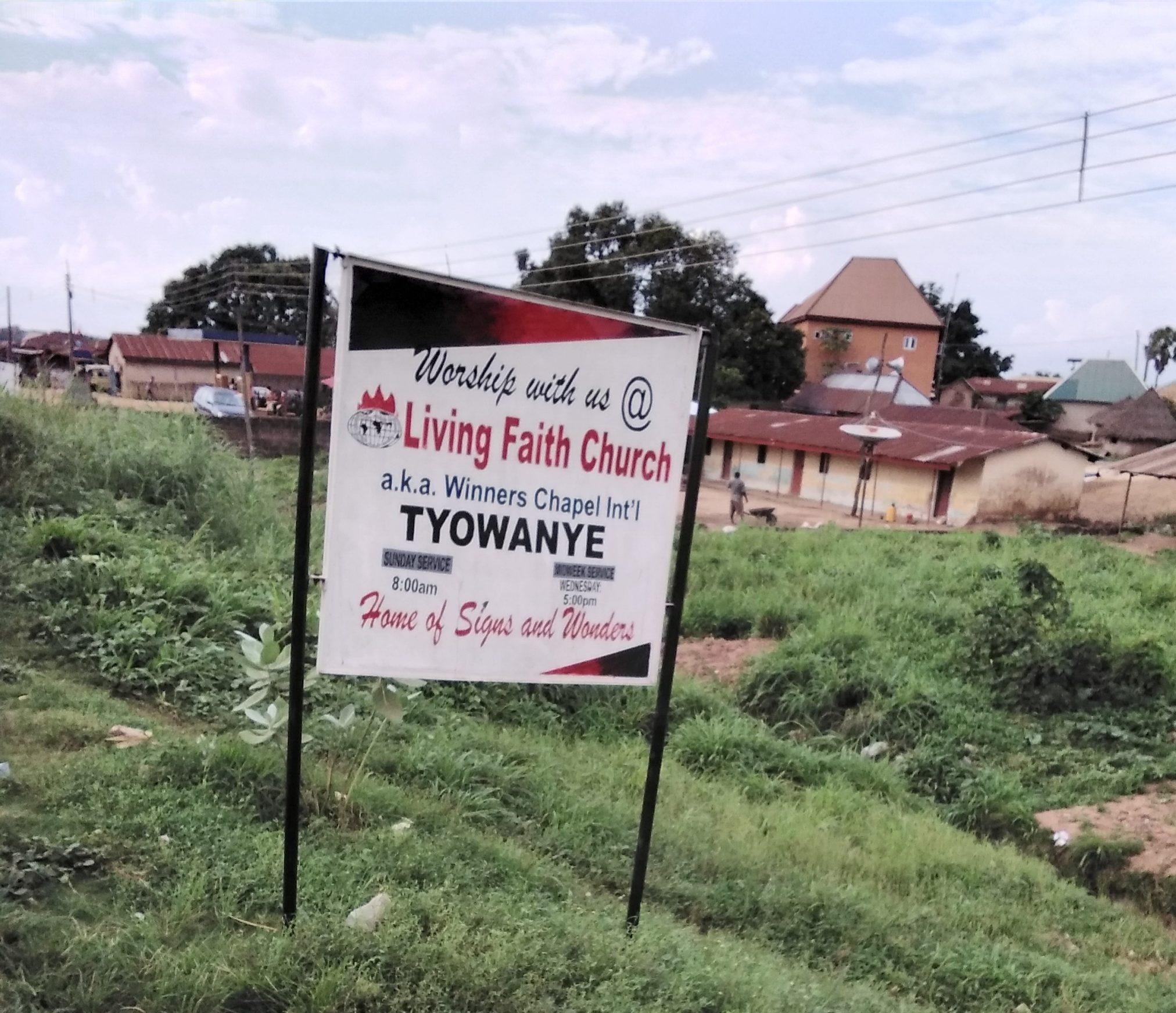
CREATION
Buruku Local Government was created out of the present Gboko Local Government Area in 1991. However, Buruku Local Government once existed in 1982, during the second republic (then, was called Ambighir Local Government) but was phased out along numerous Local Government in the Country in 1984, by a military government, which came to power on December 31, 1983.
BOUNDARIES
Buruku Local Government is bordered with:
East: Logo and Katsina-Ala local government Area.
West: Ushongo Local Government Area.
North: by Guma and Tarka Local Government Area.
South: by Gboko Local Government Area.
ETHNIC COMPOSITION
Tiv
Etulo
Nyifon
Abakwa
POPULATION
Buruku Local Government has a population of 203,721 according to the 2006 Census, with 3.0% growth rate.
LANDMASS
Buruku Local Government has a landmass of about 1,246 square kilometers. And lies around latitude 10° 37′ 0” N, longitude 7° 14′ 0′ E.
COUNCIL WARDS
Binev
Etulo
Mbaya
Mbaapen
Mbaatirkyaa
Mbaakura
Mbakyongo
Mbayaka
Mbakyaan
Mbaade
Mbaazagee
Mbatyough
Shorov
For administrative convenience, the local government is is divided into Four Development Areas, namely:
Mbatie
Twowanye
Abwa
Mbalagh
Council Wards according to their Development Areas.
MBATIE
Mbaya, Mbaapen
MBALAGH
Binev, Mbaatirkyaa, Mbakyongo
ABWA
Mbatyough, Mbaade, Mbaazagee, Mbaakura
TYÔWANYE
Mbakyaan, Mbayaka, Shorov, Etulo
MAJOR MARKETS
Buruku, Abwa, Adi, Uga, Usen, Kur, Anvanmbe, Abakwa, Ashibi, Diwa, Adogo, Anshav, Tomanyiin, Ortese-Mbaatsua, Jingir, Ugbema, Tomataan, Ashamena, Tyowanye, Nyamatsor among others.
FEATURES
Buruku Local Government is characterized by important geographical features including; River Katsina-Ala, Ambighir, Amile, Dura etc. There are also streams, ponds, alluvial soil and forests.
AGRICULTURE
Buruku Local Government is basically an agrarian area; it’s one of the leading agricultural production area in Benue State. Buruku land is generally fertile and suitable for food and Cash such as Rice, Beans, Cassava, sugarcane, Soyabean, yam, Vegetables, groundnut, okra and Melon. Economic trees like Citrus, Palm, Mangoes, Orange, Guava, pawpaw also abound in Buruku Local Government Area.
Buruku Local Government boasts of a wide stretch of river system with great potential for a viable fishing industry, dry season farming through irrigation and for an inland waterway transportation.
MINERAL RESOURCES
Buruku Local Government Area is endowed with many minerals which includes; limestone, sharp sand, salt, gravel, natural gas, clay, coal among others.
PEOPLE
A reasonable percentage of the Buruku people are literate with many of them in the academia serving at various levels both at home and in the diaspora. They’re also a catalogue of medical professionals and administrators as well as civil servants that are contributing to the growth and development of the nation.
RELIGION
The religious life of Buruku people can be seen in three distinctive groups.
There’s a dominant Christian group, and the group of Traditional Worshipers who believe in the worship of “Akombo” and “Tsav”, which are forms of traditional belief or ancestry heritage.
CULTURE
The local government possess a rich and diverse cultural heritage which finds expression in colourful clothes, exotic masquerades, sophisticated music and dances.
Traditional dances from Buruku have won accolade at State and National festivals. These dances include; Ingyough, Ange, Anchanakupa, Swange, Kureke and Tomsule dance.
The Buruku Kwagh-hir theater provides memorable entertaiment in its dramatization of Tiv folklore and social commentary.
Politically, Buruku Local Government is the only single Local Government in Benue State which has Federal Constituency and one State House of Assembly and still fighting to restore one more State House of Assembly.
